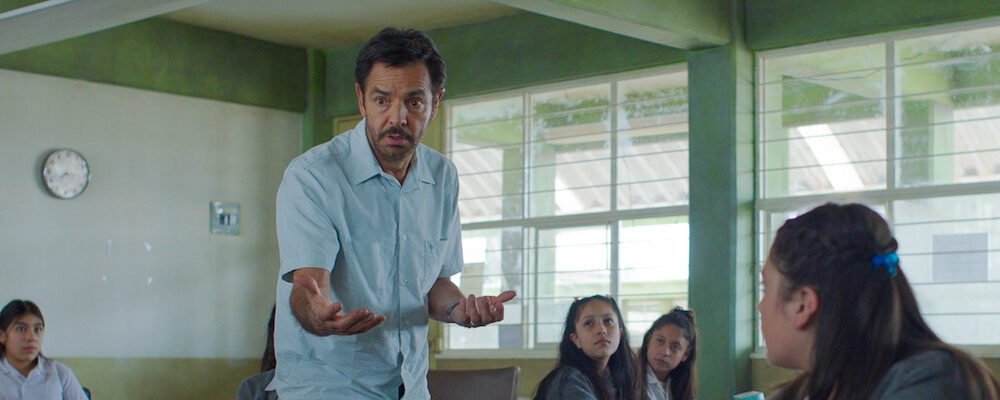‘Radical’ Tells a Powerful True Story About a Mexican Teacher Determined to Change the System
Alci Rengifo
The title of the film “Radical” has a special meaning different from the way movies tend to use the word. In this film, the most radical act is asking an educational system to actually educate as opposed to merely instruct. This is an even more extreme proposition in a country like Mexico, which like most of Latin America, is beset by incredible inequality. Mexican comedy star Eugenio Derbez makes his first true effort here of carrying a drama and it’s a great choice. That natural quirk inherent to most comedians helps him bring to life an endearing version of a real life. Sergio Juárez really does exist as a sixth grade teacher in Matamoros, Mexico. His great act of heroism was in challenging a system that doesn’t seem to care about what happens in its dilapidated schools, while opening his class’s minds to the true joys of learning.
Director Christopher Zalla stays true to the story he first encountered in a Wired magazine article. The setting is Matamoros, where the José Urbina López Primary School is the kind of post no teacher wants. The principal, Chucho (Daniel Haddad), is stunned when new teacher Sergio (Derbez) actually asks to be assigned here. The kids tend to be rowdy considering they’re growing up in a community already grappling with drug gangs and corrupt politicians. But Sergio is bringing his own ideas inspired by Sugata Mitra, a British professor of educational technology who promotes student-led learning. Unfortunately, the computers Sergio believes will help him are not available at all. Even the encyclopedias here are 30-years-old. Yet, Sergio is determined to change the situation and begins to challenge the students by making them the real focus. In the class we also meet Nico (Danilo Guardiola), a scrappy kid and Paloma (Jennifer Trejo), who is fascinated by astronomy.
“It’s not that far off from our own system,” Zalla tells Entertainment Voice. “Obviously, there’s a big difference in resources. But school here is also basically a daycare or discipline camp where you’re going to have things thrown at you that you need to memorize. In this story, there was a school without resources and yet a teacher who broke the paradigm of school as prison.” As in other classic films about bold teachers within ossified systems like “Stand and Deliver,” Zalla’s film is rebellious in a practical, necessary way. In life one is lucky to find a teacher or mentor who genuinely cares. Sergio is so committed to actually teaching that his colleagues don’t know how to respond. He almost looks like a freak among the staff. In turn, the students are so used to lifeless adults that Sergio’s presence also startles them at first. He talks to them about philosophers such as John Stuart Mill and explains scientific processes with a simplicity even some adults probably need.
Eugenio Derbez, known in Latin America for his TV slapstick and in the U.S. for comedies like “Overboard,” has been starting to flirt with serious drama. A real breakthrough came with his role as a music teacher in the Oscar-winning “Coda.” In “Radical,” which won the Festival Favorite Award at Sundance, he goes against the grain of famous subversive teachers from movies like “Dangerous Minds.” He’s not the experienced tough guy teaching the kids survival skills, but a sincere teacher who wants them to be better than what their surroundings claim they should be. It’s one of the few ways to break certain cultural wheels imposed by inequality. Never will it be easy and a student like Lupe (Mia Fernanda Solis) may develop a love for philosophy books, but soon drops out of school to look after her baby brother. Nico has wit, but his older brother is already grooming him to get sucked into the local gang scene. He gets close to Paloma, who provides a genuine bond away from the toxicity offered by the streets.
Zalla keeps the film stark, filming Matamoros with the kind of soft and cold lighting similar to Alfonso Cuaron’s own work in Mexico. This evokes well the social conditions Sergio is up against, where even the principal has to be won over. At heart the screenplay is asking what being educated truly means. Not just in the developing world, but even in the United States, college students are more and more seeing degrees as automatic slot machines and not opportunities for genuine self-discovery. Sergio wants these kids to realize the value of wanting to know about the world. When a school official comes to test the kids in order to challenge Sergio’s methods, he bombards them with boringly empty questions that will remind anyone of why classrooms can be torture.
“Radical” has a wonderful authenticity that comes from the fact that most of its cast is non-professional actors. The students are not child actors plucked from agencies, but genuine locals. Derbez’s interactions are thus charged with a special enthusiasm. Everyone feels real, because they are, and we genuinely feel for everyone involved. You don’t have to be from a struggling corner of Mexico to know institutions can be suffocating when we are kids. To find a genuine teacher, whether in life or at school, is one of the luckiest turns life can give us. Sometimes we find them in our vocations, sometimes when we’re younger as these kids do through Sergio. It’s inspiring to know at the end of the movie that he is still in Matamoros teaching. “The idea of starting with education shouldn’t sound radical, but it is,” says Zalla. “Support people’s ability to create opportunity. When people don’t believe they can improve their lives they do desperate things. The magic of this story is that Sergio showed those kids there is another way.”
“Radical” releases Nov. 3 in select theaters.

